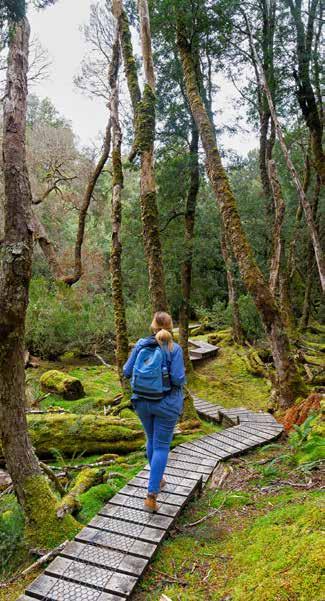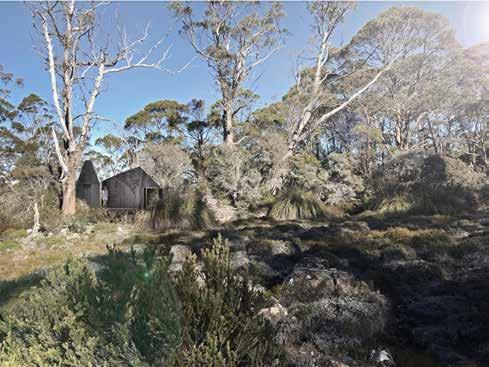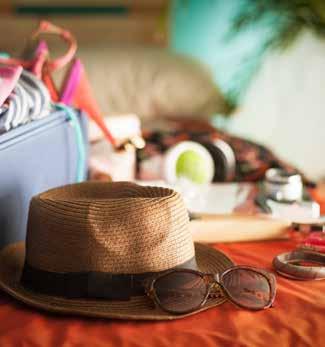
5 minute read
In focus: Riding the storm out
We’ve heard myriad stories of the financial destruction and despair that COVID-19 has brought to many businesses.
But a number of Tasmanian operators have proven that you could find positives from the pandemic pain if you were quick to pivot in the crisis.
Advertisement
For Kerry Houston, the problem has been managed with a calm approach. Kerry and her husband Alastair spent a year renovating Stanley’s iconic old 1840’s pub and transformed it into the increasingly popular Ship Inn Stanley in July, 2019. They couldn’t believe it when the North West was hit by the state’s worst outbreak of the virus and their booming business fell silent. “It was quite shocking. We had internal contingency plans in place for things like staffing issues or problems with the building but we had no contingency for a pandemic. It had never crossed our mind,” she says. “We didn’t know how we would come through the hardest lockdown in Australia at that stage in the North-West and thought we’d be seen as a pariah of Australia. Our social media followers dropped like flies at the time which was really interesting to watch people “unfollow” you.” Kerry admits their response to COVID was not developed with a complex thought process or deep analysis. “We had a mainland newspaper ring our PR person wanting to do a story on what specials we were offering to encourage travel and we actually hadn’t thought about it,” she recalls. “We remembered hearing one of the TICT podcasts which talked about offering a special discount of ‘stay three nights, pay for two’ because rather than devaluing your price you could maintain your price range but provide an extra night as a gift, which actually encouraged people to stay in the Stanley and North-West region for a longer period of time too. “It’s been amazing - one weekend we thought we had the most expensive driveway in the country - there was a Maserati, BMW and Mercedes in the driveway and those people would normally be in the South of France or Croatia or cruising the canals of Europe but instead they were at the Ship Inn Stanley!” “It was an unknown market but we just did it and haven’t really looked back.” The Ship Inn Stanley expanded its offering during the enforced break, with the conversion of the adjacent old billiard hall to a guest lounge due for completion in Summer. “For couples who are travelling together it is nice for them to have their own rooms but be able to meet in a communal space where they can bunker down and feel safe,” she said. “You can’t worry about what is out of your control. You can only set up your safety procedures to the best of your ability with
the resources available to you because you don’t want to be the business responsible for a cluster so that is a big responsibility. “We have a lock box now instead of personally greeting each visitor with a sit down chat on arrival which gives flexibility benefits for check-in, so there have been little positives.” Frogmore Creek implemented a successful initiative to keep customers engaged and workers employed during the height of the pandemic. The Cambridge cellar door and restaurant adapted within a week, offering take-away with a difference, says Business Development Manager Damian Mather. “We wanted to continue to provide Tasmanians with the delicious food, beautiful wine and great customer service that we are renowned for,” Mr Mather said. “We’ve never played in the sphere of take-away because we thrive on the relationships we have with tourists and locals that come in. But we pivoted to develop Frogmore At Home where we created a menu so our followers could replicate our dishes at home, even including garnishes from our
Photo: Marnie Hawson
garden to complete the dish. “We’ve got a great team of chefs and other staff who contributed ideas and our Front of House teams became delivery drivers servicing the routes, which really contributed to the success of the offering and became part of the connection to our guests.” As restrictions eased, the business reopened in stages and is now opening five days a week at its Cambridge venue and also its city venue, The Lounge by Frogmore Creek under Macq01. The Frogmore At Home concept is continuing and will
Photo: Frogmore Creek
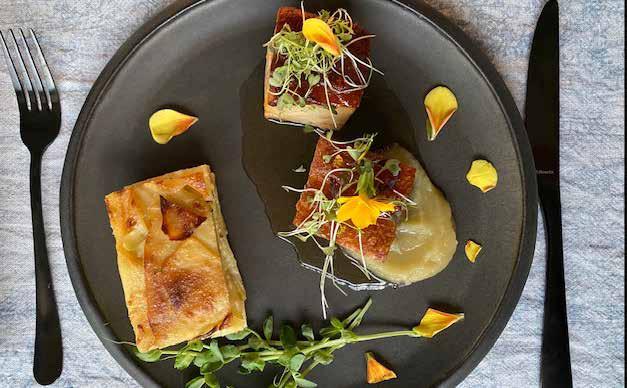
be scaled back up if needed to cater for those not comfortable venturing out and about once borders reopen. Kerry and Damian both say that there is a sense of optimism for parts of the industry and they are joined in that opinion by Holger Strie, the Owner and Managing Director of Trek Tours Australia, which operates a number of outdoor adventure experiences around the country, including two in Tasmania. Mr Strie says forward bookings are back to pre-Covid levels. “We are planning for the long term because short term planning is very, very difficult and stressful in the current climate,” he said. “Our bookings for nine months ahead are solid but we just don’t know when we will be guiding our next trip and we have to plan for a worst case scenario. “If the border reopening goes smoothly and confidence builds up I am expecting it to be as good a Summer as last year. “You have to expect the unexpected and thankfully we had had a really good 12 months’ prior so we had a good buffer. A lot of businesses probably capitalised on such a good climate and borrowed more money to expand but we were cautious that has helped us through despite not having much cash flow for six months.” The extra time associated with closed doors has meant the Trek team has had capacity to deliver on planned diversification initiatives. Prior to COVID-19, the business had invested in former forestry and farming properties at Glengarry and Exeter, on the West Tamar, in a bid to offset its carbon emissions. “Our philosophy and story is all about how tourism businesses can impact positively on the environment and because our guides and our guests all fly everywhere we have a big carbon foot-print we want to off-set.
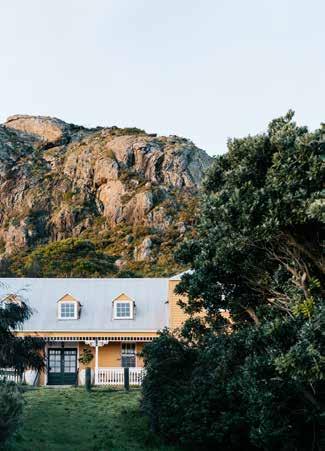
Trek Tours Australia
Trek Tours Australia
Photo: Marnie Hawson
“We bought the degraded properties and our guides have been kept in work helping to improve the soil and pasture and biodiversity. We have become primary producers with cattle, goats and sheep and tourism will play a big role on the properties once we are back up and running with on farm stays before and after trips. “We believe we have an important role to play in changing perspectives on native forest logging on both sides of the debate through showcasing how careful management of biodiversity can increase carbon sequestration, conservation value and still maintain high profitability. “It was always the plan to do it but we have diversified a lot more quickly to future proof our business. COVID probably sped up the project by five years.”

